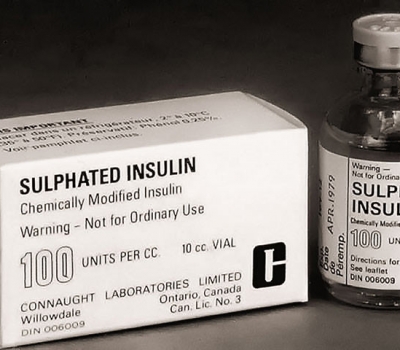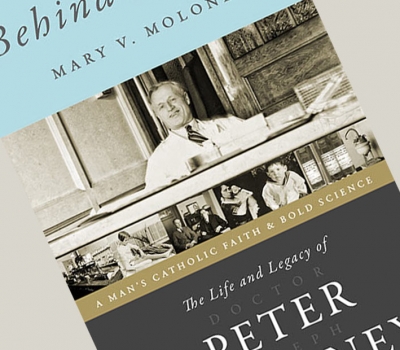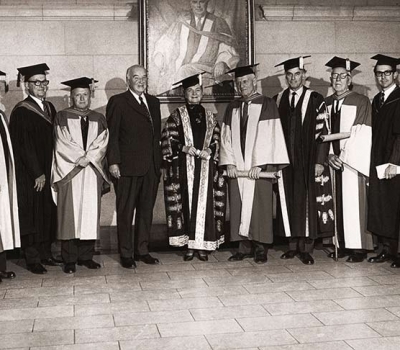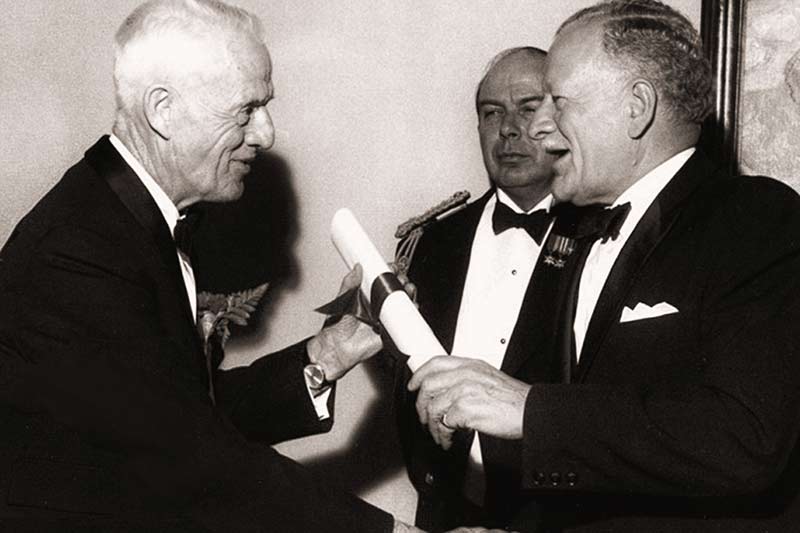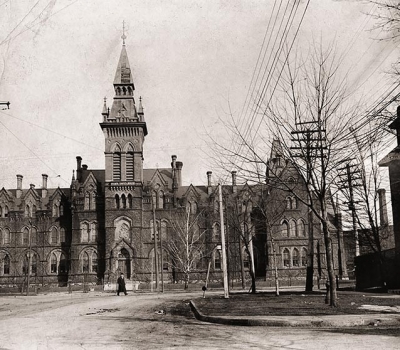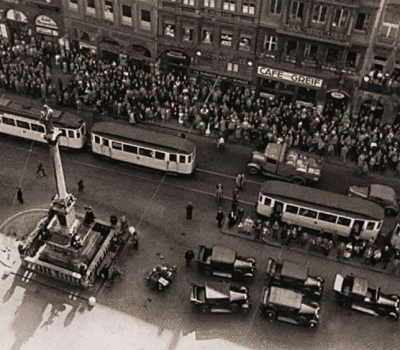Dr. Peter Moloney knew Dr. Charles Best very well. Moloney would be called in to assist with the purification of insulin, and it was the original work of Dr. Moloney that helped to solve this urgent problem, leading to his Ph. D. entitled "On the Purification of Insulin". They remained friends for many years, and in recognition of his supportive achievements, Moloney would receive the first Charles H. Best Prize in 1971 from Best himself at the banquet considered the highlight of the evening. This article, which summarizes this event which was held north-west of Montreal in the Laurentian mountains at Mont Gabriel, Quebec on October 14-15. There were only 55 invited participants. Dr. Moloney presented his paper "Immunity and Induced Immunotolerance to Insulin" at this conference on October 14.
Dr. Peter J. Moloney of Toronto, whose contributions to the immunochemistry of insulin produced a major breakthrough in diabetes research, received the first Charles H. Best Prize towards the end of 1971.
The Prize, consisting of a citation, a gold medallion bearing the likeness of Dr. Best, the co-discoverer of insulin, and $1,000, was presented to Dr. Moloney by Dr. Best at the Fifth Canadian Hoechst Workshop on Diabetes held at Mont Gabriel.
The Award, established by Hoechst Pharmaceuticals to commemorate the 50th Anniversary of the discovery of insulin, is "to give recognition to an investigator in the basic or clinical sciences for outstanding original work in the field of diabetes conducted in Canada. The prize is not necessarily awarded for the candidate's most recent work, but may be awarded on the basis of overall achievements of long standing in the field of diabetes."
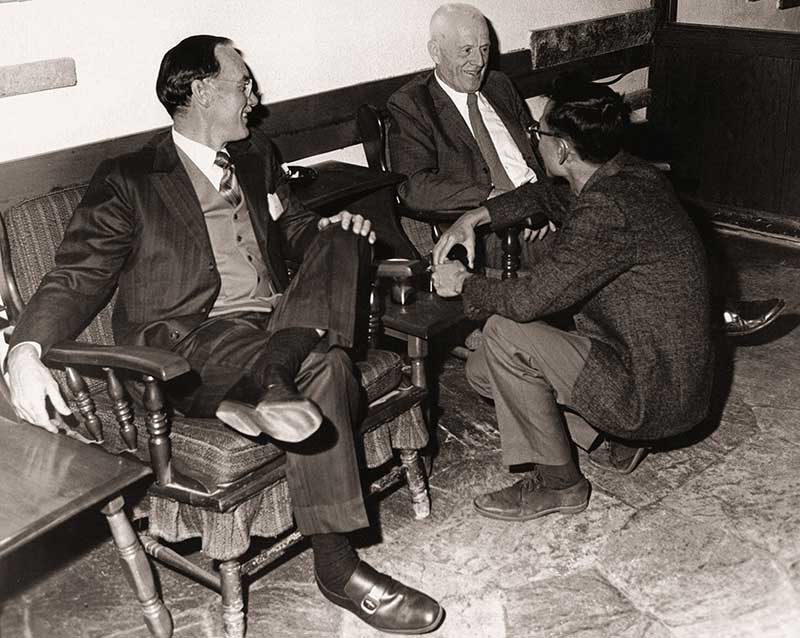 MOLONEY WITH DR LITTLE 1971, about to receive Charles Best Prize
MOLONEY WITH DR LITTLE 1971, about to receive Charles Best Prize
Referring to the extraordinary achievements of Dr. Moloney, a native of Penetanguishene (and Powassan) Ontario, Dr. Best cited his "contributions of special and conspicuous merit in the biological sciences, particularly in elucidating fundamental aspects of the immunochemistry of insulin."
In the early fifties, Dr.Moloney firmly established that insulin is an antigen capable of producing antibodies, resulting in a resistance to insulin. This enabled other investigators to develop an immunoassay technique for relatively simple measurement of insulin in the blood, and this, in turn, aided clinical investigators, by determination of blood insulin levels, to identify groups of diabetics who respond abnormally to various stimuli for insulin secretion.
Dr. Moloney's efforts have enabled research to proceed to such profound depths that knowledge of diabetes has been greatly enhanced. At the level of treatment modified forms of insulin are now available for diabetic patients who have developed resistance to insulin as a result of producing specific antibodies against it. There is also the expectation that the development of a non-antigenic, or mildly antigenic insulin is imminent, which would be a major advance in the treatment of certain groups of diabetics.
Born on June 29, 1891, Dr. Moloney received his M.A. degree in chemistry from the University of Toronto in 1915, and his Ph. D. at the University of Toronto in 1924. He was Assistant Director at Connaught Medical Research Laboratories from 1925 to 1960 and currently serves as Consultant to Connaught. Among his many honours he was the recipient of the Banting Medal conferred by the American Diabetic Association in 1964, was awarded the Charles Mickle Fellowship the same year and received Canada's highest medical prize, the Gairdner Award, in 1967.
-Canadian Diabetic Association Newsletter First Quarter 1972
"The first paper of the afternoon session on October 14 was presented by Dr. Moloney, Connaught Medical Research Laboratories, University of Toronto on Immunity and Induced Immunotolerance to Insulin. The immunological properties of insulins of various animal species were reviewed with main emphasis on the immunoproperties of ox insulin which were altered by the introduction of certain chemical groups. Sulphated insulin for example required more antibody per hypoglycemic unit for neutralization than did unaltered ox insulin and it also had a lowered antigenicity. The antigenicity of ox insulin was suppressed to a high degree by saturation with maleyl groups. Immunotolerance to ox insulin was induced in the adult guinea pig by the injection of maleyl insulin. Factors involved in the induction of immunotolerance so parallel those involved in the induction of immunity as to suggest that the induction of immunotolerance and of immunity are basically the same thing.
The highlight of the evening was the banquet and the presentation of the first Charles H. Best Prize to Dr. P. J. Moloney by Dr. Best. The prize (established by Canadian Hoechst Ltd., it consists of a medal, citation and a cheque for $1,000.) was bestowed on Dr. Moloney for the elucidation of fundamental aspects of the chemistry of immunochemistry of insulin which was instrumental in the development of the immunoassay for insulin by Drs. Berson and Yalow."
-C.M.A. Journal/November6, 1971, Vol. 105, p. 995-996.
Citation:
"The Canadian Hoeschst Workshop on Diabetes Presents the Charles H. Best Prize 1971 to Peter Joseph Moloney O.B.E., M.A., Ph.D., F.R.S.C. in recognition of his contributions of special and conspicuous merit in Biological Sciences particularly in elucidating fundamental aspects of the immunochemistry of insulin."
First Charles H. Best Prize Awarded for Insulin Research
"As part of the celebrations to mark the 50th anniversary of the discovery of insulin, a Toronto research scientist was recently presented with the first Charles H. Best prize for diabetes research.
Dr. Peter J. Moloney, former assistant director of the Connaught Medical Research Laboratories, received a gold medallion bearing the likeness of Dr. Best, co-discoverer of insulin, a citation and $1,000 for his contributions to the immunochemistry of insulin. The award was presented by Dr. Best at the Fifth Canadian Hoescht Workshop on Diabetes held at Mont Gabriel, Quebec, October 14-15.
The award, establisehd earlier this year by Hoescht Pharmaceuticals, is to give recognition to an investigator in the basic or clinical sciences for outstanding original work in the field of diabetes in Canada. The prize is not necessarily awarded for the candidate's most recent work, but may be awarded on the basis of overall achievements of longstanding in the field of diabetes. Dr. Moloney established in the early 1950s that insulin was an antigen capable of producing antibodies.
-Canadian Family Physician November 1971 page 20


